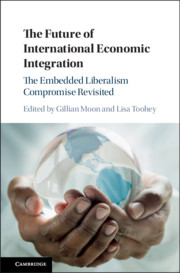Book contents
- The Future of International Economic Integration
- The Future of International Economic Integration
- Copyright page
- Contents
- Contributors
- Foreword
- Preface
- Acronyms
- Part I The Concept of the Embedded Liberalism Compromise
- Part II The Dynamic of the Embedded Liberalism Compromise
- 6 From Agriculture to Food Security
- 7 Embedded Liberalism and National Treatment
- 8 Embedded Liberalism and International Investment Agreements
- 9 Regulatory Coherence in Future Free Trade Agreements and the Idea of the Embedded Liberalism Compromise
- Part III Engineering the Embedded Liberalism Compromise: Addressing the Future in Times of Turmoil
- Index
9 - Regulatory Coherence in Future Free Trade Agreements and the Idea of the Embedded Liberalism Compromise
from Part II - The Dynamic of the Embedded Liberalism Compromise
Published online by Cambridge University Press: 21 September 2018
- The Future of International Economic Integration
- The Future of International Economic Integration
- Copyright page
- Contents
- Contributors
- Foreword
- Preface
- Acronyms
- Part I The Concept of the Embedded Liberalism Compromise
- Part II The Dynamic of the Embedded Liberalism Compromise
- 6 From Agriculture to Food Security
- 7 Embedded Liberalism and National Treatment
- 8 Embedded Liberalism and International Investment Agreements
- 9 Regulatory Coherence in Future Free Trade Agreements and the Idea of the Embedded Liberalism Compromise
- Part III Engineering the Embedded Liberalism Compromise: Addressing the Future in Times of Turmoil
- Index
Summary
- Type
- Chapter
- Information
- The Future of International Economic IntegrationThe Embedded Liberalism Compromise Revisited, pp. 137 - 158Publisher: Cambridge University PressPrint publication year: 2018



